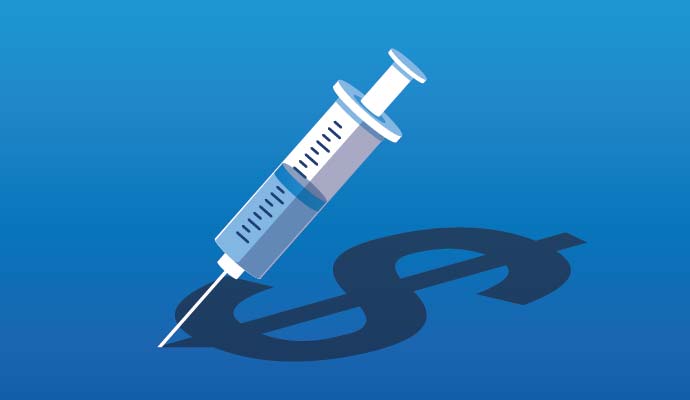Hospitals to Lose $1K Per COVID-19 Case Despite Medicare Rate Bump
Even with the 20% Medicare rate increase in the stimulus package, hospitals are set to lose about $1,200 per COVID-19 hospitalization, a new analysis shows.

Source: Getty Images
- The coronavirus stimulus package earmarked billions of dollars for hospitals and other frontline providers, but the emergency funding still might not be enough to support hospitals facing significant financial losses from the COVID-19 pandemic.
For more coronavirus updates, visit our resource page, updated twice daily by Xtelligent Healthcare Media.
Hospitals could lose about $1,200 per COVID-19 case even with the 20 percent increase in Medicare reimbursement included in the stimulus package, according to a new analysis from Strata Decision Technology. For some health systems, those losses could translate to $6,000 to $8,000 depending on payer mix.
COVID-19 cases incur unusually high costs, the analysis found using research from Italy, China, and the CDC to simulate characteristics of COVID-19 patients.
“The complexity of the patients is causing a decline in nurse staffing ratios as nurses and staff are required to help each other validate that their personal protective equipment (PPE) is properly fitted,” according to the analysis.
READ MORE: Congress Passes CARES Act Giving $100B in Hospital Funds for COVID-19
“Costs are also higher due to expanded cleaning regimens, PPE shortages, more frequent X-rays and CT scans, and overall higher supply and drug costs. Overall, it takes longer and requires more to care for these patients than even the proxy DRGs selected.”
The US now as the most confirmed cases of COVID-19, with the latest figures from Johns Hopkins University pinning that number at 143,055 at the time this article’s publication.
A significant portion of confirmed COVID-19 cases will require hospitalization. A recent CDC report detailing outcomes among COVID-19 patients in the US from Feb. 12 to March 16, 2020, showed that between 21 and 31 percent of patients were hospitalized and 5 to 12 percent were admitted to an intensive care unit.
But the number of COVID-19 cases ending up in the hospital could total as many as 4.8 million patients, according to estimates from infectious disease experts shared with the American Hospital Association (AHA).
The growing number of hospitalizations is putting strain on operations. Providers across the care continuum are reporting significant shortages of personal protective equipment (PPE) and other needed supplies, which are increasing costs as vendor fees skyrocket.
READ MORE: Playing Defense Key to Overcoming Fiscal Challenges of COVID-19
In addition, hospitals are losing a key source of revenue: elective surgeries.
“Elective cases are the primary source of revenue for many hospitals, allowing them to take a loss on certain other services while remaining profitable,” researchers at Strata Decision Technology explained. “Researchers estimate that 90 percent of hospitals that cancel all elective procedures will shortly begin to experience negative profit margins from COVID-19 cases.”
Earlier this month, CMS recommended that healthcare organizations delay all elective surgeries, as well as non-essential medical, surgical, and dental procedures, during the COVID-19 outbreak. The agency went on to provide a tiered framework for postponing procedures.
“The reality is clear and the stakes are high: we need to preserve personal protective equipment for those on the front lines of this fight,” CMS Administrator Seema Verma stated in the March 18 announcement.
The American Hospital Association (AHA) supported CMS’ decision to release a recommendation, especially since CMS deferred decisions to local public health officials and surgeons. The association and several other major industry groups previously criticized past recommendations and comments from national healthcare leaders including the Surgeon General that pushed providers to cancel all elective procedures.
READ MORE: How COVID-19 Is Impacting the Healthcare Revenue Cycle
With the new coronavirus stimulus package, Congress and the White House are looking to help hospitals and other providers facing a financial crisis from the COVID-19 outbreak. The package contained more than $100 billion in emergency funding to hospitals and other providers and will implement a 20 percent rate hike for Medicare hospitalizations.
However, the increase in reimbursement may not be enough to offset the loss of the high-margin procedures and the sudden influx of high-cost hospitalizations.
“With the predicted loss of up to $6,000 to $8,000 per case on treatment of COVID-19 patients, even with the proposed 20 percent increase in payment, many hospitals will not be able to survive the damage to their cash flow for longer than 60-90 days,” authors of the Strata Decision Technology analysis stated.
Depending on the amount and impact of additional financial relief, hospitals may be forced to reduce costs through dismissing or furloughing large quantities of non-clinical staff who are responsible for a variety of key functions, such as converting hospital beds and maintaining equipment, they stated.
The authors concluded that a 35 percent increase in Medicare reimbursement for COVID-19 hospitalizations would provide more financial assistance to hospitals during the pandemic. But even that increase would not resolve broader revenue losses from canceled elective procedures, they said.
“If the pandemic and correlated loss of elective cases continues into the Fall of 2020, increased reimbursement would need to come from commercial payers and Medicaid as well as Medicare.”
